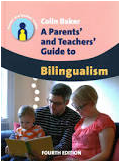Bilingual Children's Mother Tongue: Why Is It Important for Education?
|
" The term globalization is never far from the front pages of newspapers these days. It evokes strong positive or negative feelings depending upon whether it is being praised by the business community for opening up world markets to more extensive trade or condemned by those who associate the term with the dramatically widening gap between rich and poor nations and people."
Jim Cummins University of Toronto |
|
The Importance of Mother Tongue
|
"The importance of the mother tongue can be summarized into one sentence:
Children in international schools learn English more quickly and effectively if they maintain and develop their proficiency in their mother tongue." Beth Queeney-Dressler |
|

A Parents' and Teachers' Guide to Bilingualism
One of the best books a teacher or a parent can buy on the subject of bilingualism is Professor Colin Baker's book, "A Parents' and Teachers' Guide to Bilingualism".
The Summary
In this accessible guide to bilingualism in the family and the classroom, Colin Baker delivers a realistic picture of the joys and difficulties of raising bilingual children. The Q&A format of this book makes it the natural choice for the busy parent or teacher who needs an easy reference guide to the most frequently asked questions. This revised edition includes more information on bilingualism in the digital age, and incorporates the latest research in areas such as neonatal language experience, multilingualism, language mixing and the effect that siblings have on family language choice.
One of the best books a teacher or a parent can buy on the subject of bilingualism is Professor Colin Baker's book, "A Parents' and Teachers' Guide to Bilingualism".
The Summary
In this accessible guide to bilingualism in the family and the classroom, Colin Baker delivers a realistic picture of the joys and difficulties of raising bilingual children. The Q&A format of this book makes it the natural choice for the busy parent or teacher who needs an easy reference guide to the most frequently asked questions. This revised edition includes more information on bilingualism in the digital age, and incorporates the latest research in areas such as neonatal language experience, multilingualism, language mixing and the effect that siblings have on family language choice.
